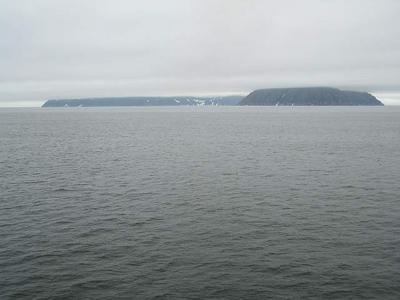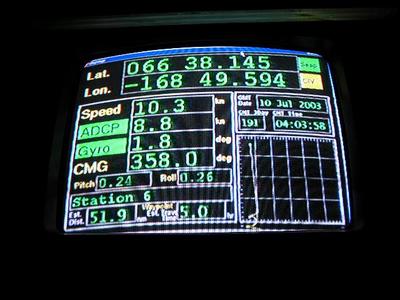9 July, 2003
Instead of repeating much of what Jim Swift said below, I thought it
would be best if you heard from him in his own words.
Chief Scientist's Report #1
R/V Nathaniel B. Palmer SBI Survey Cruise
09 July 2003
James H. Swift
Tonight at 1934 Alaska Time the distinguished Antarctic research
vessel R/V Nathaniel B. Palmer crossed 66 deg 33 min North Latitude,
and thus has become, for at least this one cruise, an Arctic research
vessel.
The Palmer is embarked on a survey of the distributions of
hydrographic parameters in the Chukchi Sea, the Chukchi and Beaufort
continental slopes, and the near-shelf reaches of the Canada Basin of
the Arctic Ocean. The cruise is one of eight during 2002-2004 for the
Western Arctic Shelf-Basin Interactions Phase II Field Program (SBI),
and is the only survey-type cruise of that program.
All of the scientific party reached the Palmer in Dutch Harbor,
Alaska, before departure on 05 July, although many of the group
experienced delays of one or two days due to flight cancellations
(low ceilings at Dutch Harbor), and so the vessel's departure was
delayed about eight hours - into the early evening - to allow those
who finally made flights that day to join the ship.
We departed Dutch Harbor in excellent weather, and the weather
remained excellent during the two and one half day run north to Nome,
Alaska. There we picked up the helicopter, pilot, and mechanic who
will support ice reconnaissance, a marine mammal observation program,
and ferrying the science party ashore at the end of the cruise.
Our science program began early this morning with a five-station
CTD/hydrographic section across US waters in Bering Strait. The
stations went well, the only problem of note being a hydraulic
failure on the starboard A-frame which cancelled the first of three
planned bongo net tows on the section, but that program was soon back
in action.
Ceilings lowered and fog increased late this morning, making weather
unsuitable for flying, so Community Parcticipant Charles Menadelook's
friends brought him out to the ship by small boat from his home on
Little Diomede Island. All aboard are looking forward to his ca.
5-day visit.
We are now running north to our next stations, and expect to be
working sections over the Beaufort slope, north of Barrow, Alaska, in
a few days.
We have a busy science program planned for the cruise, though we
expect we will need to adjust our plans to the realities of ice and
weather conditions. For now, the start could hardly have gone
better. >From the spotless labs and smoothly functioning equipment to
our comfortable cabins we are surrounded by evidence that it is our
good fortune to sail on an outstanding research vessel. But it's all
about people, and that's where Captain Joe Borkowski III, his
officers and crew (the galley staff in parcticular has already won
many hearts), and the Raytheon Polar Services science support team
lead by Dr. Karl Newyear excel. Simply put, we feel welcome here.
All is well.

Little Diomede Island (Alaska) in the foreground to the right with Big Diomede Island (Russia) behind and to the left.

Monitor displays the Palmer's first crossing of the Arctic Circle at 66 and one third degrees north latitude. Note that Greenwich Mean Time in the United Kingdom shows that it's already the next day,10 July.

Community parcticipant Chuck Menadalook (on the right) from Little Diomede Island joins the cruise.
Contact the TEA in the field at
.
If you cannot connect through your browser, copy the
TEA's e-mail address in the "To:" line of
your favorite e-mail package.
|
